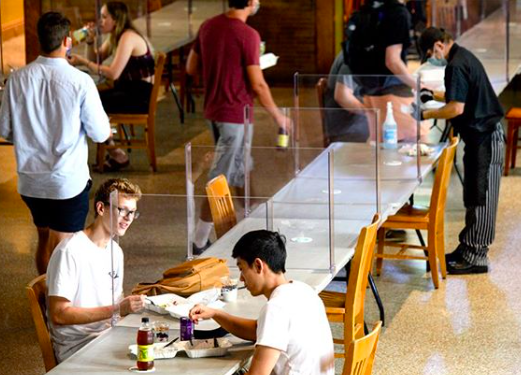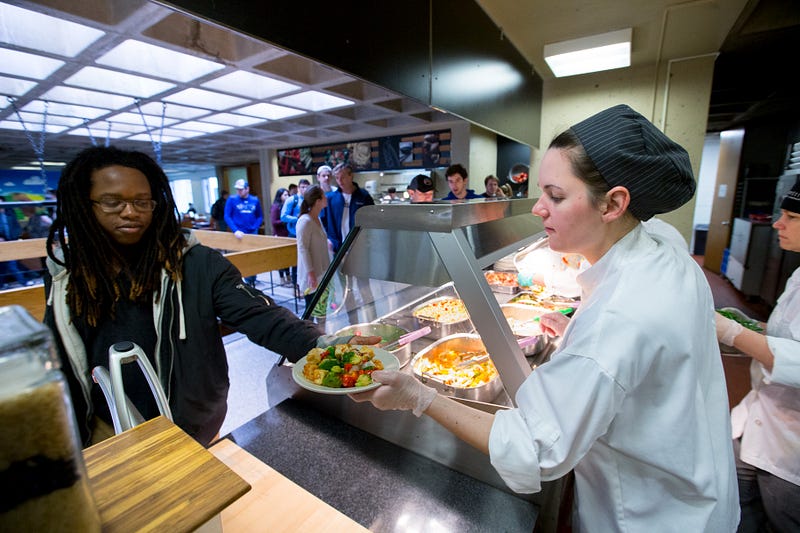
Students arriving at Hamilton in Fall 2020 found themselves on a campus with limited food options, an abundance of to-go boxes in the dining halls to encourage students to eat in their rooms or at tables set for one and plexiglass dividers between each seat in Commons and McEwen. The Diner switched to a to-go system as well, shortening its hours and serving up El Guapo’s via GrubHub orders.
By Fall 2021, Commons and McEwen had returned tables to their prior positions, the Diner’s in-person ordering system had been restored and the Little Pub had reopened. However, understaffing presented a novel challenge that ballooned lines for food, angered students and staff and led to changes in recruitment and retention strategies within Bon Appétit, the company that supplies and staffs Hamilton’s dining halls.
Bon Appétit’s workers faced the brunt of these unprecedented changes and challenges, working more hours, changing their schedules and fulfilling new responsibilities to ensure that no student went hungry. “Things the last two years were very difficult. It was very hard for the students. I had kids crying because they weren’t meeting people, and it was hard on us too…It was very hard to manage logistically,” said Marge Petteys, a self-described “Hill Card checker” at Commons.
By Fall 2021, in response to the challenges wrought by the pandemic, Bon Appétit made a variety of policy changes. Lucy Burke, Director of Procurement and Administrative Services for Hamilton College, told
The Spectator
, “We developed a plan with the Bon Appétit leadership to increase the minimum wage, provide retention and sign-on bonuses and develop other innovative recruitment strategies.”
These strategies included hiring many student workers, offering $1,500 bonuses for workers who stay three months and a “Thank-You Pay” bonus of $1,000 for all full-time employees working at Hamilton College. Despite these raises, Bon Appétit workers are still the lowest paid professional workers at Hamilton College with a minimum wage of $17. Custodians, employed directly by Hamilton College, generally make just over $21 an hour. In addition, since dining hall workers are contracted through Bon Appétit, they do not have access to certain benefits that Hamilton provides its service workers. Further, Hamilton’s service workers, unlike Bon Appétit’s dining hall employees, are represented by a union.
At the beginning of the Fall 2021 semester, Bon Appétit’s workforce stood at 45 workers compared to the desired 110 and a minimum of 90 as described by General Manager Reuben Haag at a Student Assembly meeting in September 2021. The company’s recruitment efforts eventually bore fruit, and the staffing levels rebounded to 90% of capacity by the end of the Fall semester. However, workers told
The Spectator
that staffing problems at Commons and the Diner persisted into Spring 2022, burdening workers with extra hours and stressful shifts.
“We’re a little bit understaffed now,” said Bryan Simmons, a line cook at the Diner. “People are still getting used to the idea of working as opposed to ‘wait, no, I like my free money.’ So we usually only have four people working as opposed to five.” Even with the signing bonus, “people just quit,” said Wally Kurgan, a manager at the Diner. “We had a couple of people close to [getting the bonus] and they just quit. They couldn’t handle it…it’s a hard job.”
Workers
The Spectator
interviewed detailed their two years working through a pandemic that cut staffing levels, changed menus, altered layouts of the dining halls, limited in-person interaction and continues to affect nearly every aspect of working for Bon Appétit at Hamilton College. Understaffing especially put stress on Hamilton’s dining system, with workers at Commons, already a more challenging environment than both McEwen and the Diner, shouldering the burden.
One worker
The Spectator
reached out to initially wanted to comment but was told by Operations Director Lori Barone that it was against company policy to speak with student reporters. Barone did not respond to a request for comment. Reuben Haag, General Manager of Bon Appétit, despite reading and agreeing to answer
The Spectator
’s questions, ultimately did not provide any comment.
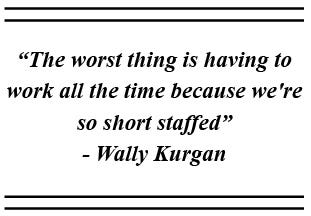
Staffing Challenges
At the beginning of the Fall 2021 semester, Burke sent out a campus-wide email addressing challenges to Hamilton dining, emphasizing the need to correct what she referred to as “severe” staffing shortages. Haag also explained this staffing shortage in a separate email to the student body: “Bon Appétit, like many foodservice providers, is understaffed and having difficulty hiring additional workers. Hamilton and Bon Appétit are working on solutions, including hiring more staff and more student workers.”
Understaffing has made work more difficult for dining hall staff, who have taken on the burden of increased responsibility. Wally, who has worked for Bon Appétit at the Diner for almost 20 years, said that Bon Appétit has had staffing issues “all the time” since COVID-19. Kurgan has personally felt obligated to take on the extra responsibility caused by the lack of staff. “The worst thing is having to work all the time because we’re so short-staffed…some people think the job is too hard because they don’t wanna work anymore,” said Kurgan.
A Commons worker who requested to be anonymous for this story said that in the Fall semester, they needed two times as many dishwashers than were employed. Further, they said that often there would be only one dishwasher on shift when they needed at least three or four to do the job properly. Dishwashers at Commons, even when fully staffed, “do way more work than everyone else,” said the anonymous Commons employee. Turnover for these positions is also incredibly high, multiple workers told
The Spectator
. “[Dishwashers] are the people who don’t wanna stick around,” said the anonymous Commons employee.
Petteys voiced similar concerns about staffing issues. “The lack of workers [makes it harder to work at Commons], but that’s not because of Bon Appétit; it’s because we can’t find people. So we’re being doubled up, and it does get stressful,” she said. Petteys continued to say that while stress for workers was an issue, it was not the end of the world. “We’ll always be short-staffed; it’s frustrating for the workers, but it’s always stressful for the managers and the supervisors. Us as workers, that’s our job, and you might get frustrated, but we have to work through it. We can’t be miserable about it; we have to do a good day’s work.”
Staffing issues resulted in personal stress for Bryan Simmons, who described having to work without enough staff to adequately handle the workload. “Remember the 18 inch snow day? Normally a staff member from Commons comes in [to the Diner] on their day off to help us, but they couldn’t that day because they had to watch their kids. And another staff member called in [sick]. So it was me, another staff member and our manager on a Friday. I had 15 minutes to scarf down lunch in a 10.5 hour day…that was probably the worst time I’ve had here,” Simmons described.
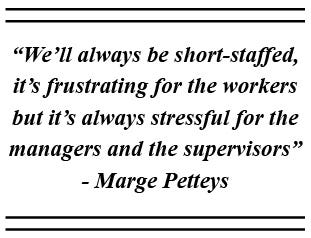
Different Dining Halls, Different Experiences
Not all dining halls are created equal when it comes to the work experience; Bon Appétit workers described working at Commons as more intense, fast-paced, stressful, and ultimately, as a more difficult job.
The Spectator
’s investigation found staffing to be one of the biggest causes of difference between working conditions at Commons, the Diner and McEwen. Simmons, who has worked at Commons as well as the Diner, said that “Commons feels a lot more fast-paced than the Diner because [the Diner] is a smaller establishment, so there are way more people who can fit in Commons.” Omar Barghout ’25, a student worker at McEwen, said “[Commons] does seem stressful — all the workers there seemed stressed.” Bruce Sansone, who has worked at both the Diner and Commons, agreed. “Diner is more like let loose, Commons is more…a dining restaurant setting,” Sansone said.
While the Diner and especially Commons felt staffing losses acutely, McEwen Hall did not. Jamie Morgan, a prep cook at McEwen, said that “we are the fullest staffed of all the buildings” and added that “when we were open for the weekends [in Spring 2021] we were short but [Fall 2021] was a little bit better.”
At the start of the Fall 2021 semester, Burke noted in her schoolwide email that Bon Appétit would reduce staffing issues by hiring student workers. However, the vast majority of those student workers worked at McEwen, not Commons. The anonymous Commons worker said that they asked management, “why aren’t we getting any students? I’m referring [students] to you all day long!” When asked why they thought student workers were being sent to McEwen instead of Commons, this worker said that “I was under the assumption that it’s because [McEwen] would be a more enjoyable work environment…They wouldn’t want to work in Commons, they absolutely wouldn’t.”
The notion of needing to protect student workers from Commons was echoed by Barghout, who has worked at McEwen since early Fall 2021. “Because Commons is where all the people who visit are… and it’s more popular… they don’t want students there messing up [Hamilton’s] image or the food,” said Barghout. “I know they’re short over there, crazy at Commons,” said Kurgan.

In addition to staffing issues, Commons workers deal with a more challenging physical layout. The Commons kitchen is located in the basement of the building, meaning that workers have to ride an elevator to bring food up to the dining hall itself. The elevator is known to break down, causing a headache for the already stressed workforce. The McEwen kitchen is directly next to the dining hall, making the process of cooking, preparing and serving a simple one.
Beyond the logistics, McEwen workers see their dining hall as a more pleasant environment to work in. Morgan, who has worked at McEwen since 2019, said that “we have a very nice view all day long,” in contrast with Commons. He continued, saying “I think the staff here [at McEwen] is much happier with their jobs.” Morgan also speculated that working at Commons is more difficult because “the volume at Commons is more…so there’s more work to do [and] I think that might play a role…they definitely serve more students than we do.”
“We have teamwork. That is the magic word,” said Sylvia Castellar, who has worked at McEwen since 2018. Both Castellar and Morgan said they would not want to work at Commons if their bosses asked them to move there.
The anonymous Commons worker said that in the past, management had denied their request to work at McEwen when they asked to move from Commons.
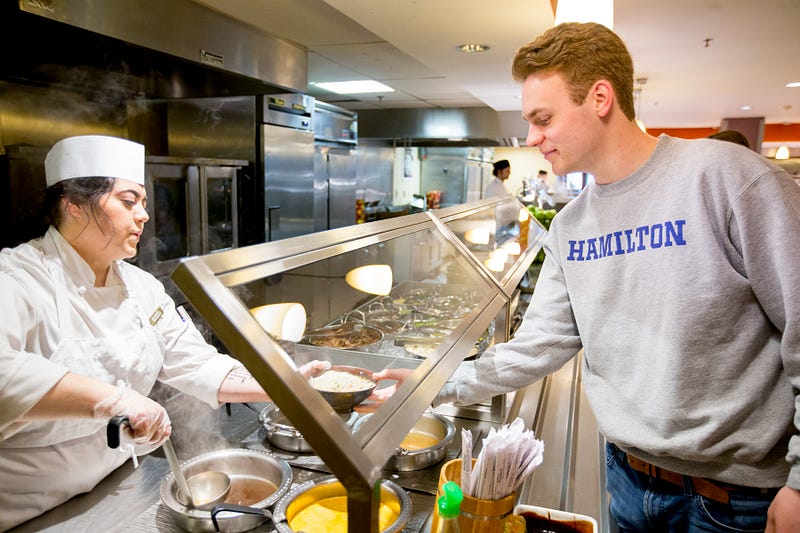
Opinions on Pay and Benefits
In Fall 2022, when understaffing was at its worst, Bon Appétit raised its minimum wage from $13 to $15 in the hopes of encouraging more applicants. The company also started a program that would award any new employee who worked for three months at Hamilton’s dining halls a $1,500 bonus. In Spring 2022, Bon Appétit raised their minimum wage again to $17. Managers, who work alongside the line cooks and food servers, now make around $18.50 an hour. Despite these pay raises, Bon Appétit’s rank-and-file employees and managers are still paid less hourly than Hamilton’s lowest-paid employees: custodians, whose hourly rate was recently raised to just over $21.
Opinions on recent pay raises differed among various employees contacted by
The Spectator
. “Pay is fair. It’s okay, but we don’t even discuss it with the other workers because you just don’t do that, and I think that’s any profession,” said Petteys. “It was very generous of them to raise base pay, because I never ever thought that they’d see where we’re coming from…For what we’re doing, I think we get paid pretty well,” said Morgan with agreement from Castellar.
Others disagreed, saying wages only covered rising inflation and that it left workers in poverty: “[pay is] not really much different because prices went up,” said Simmons. Wally said: “I get by fine…everybody wants to make more money. I don’t really talk to anybody about it…I’m content…it is what it is,” though he said that wages “could always be more, you know what I mean…if you’re not making more than $25 an hour, you’re still [in] poverty…it’s 100% true.” The anonymous Commons employee was “really unhappy,” before their second raise in Spring 2022 and felt it was a big reason dishwashers and other positions experienced so much rapid turnover. “They expect this much outta [us] for this kinda money, yeah, you wouldn’t stick around.”
This worker blamed their low pay not on their managers or Bon Appétit as a company but on Compass Group, the international conglomerate that owns Bon Appétit and several other food catering services. The company website states that Compass, the eleventh largest employer in the world, “is a global leader in food services, providing delicious and nutritious meals to millions of people, every day, across 45 countries. On a statutory basis, the annual revenue for the Group for the financial year ended 30 September 2021 was £17.9 [$22.5] billion, delivering an operating profit of £545 [$686] million.”
Compass groups’ CEO Dominic Blakemore took home $4 million in compensation in 2021 according to the Economic Research Institute. “If it’s the [eleventh] largest employer in the world, then why are we getting paid so bad? Are you not making enough money?” asked the anonymous Commons worker.
Since workers in Hamilton’s dining halls are hired through a contractor (Bon Appétit), they are not officially Hamilton employees, so they miss out on some of the benefits that Hamilton employees like custodians, groundskeepers, painters and other essential employees get. “The biggest benefit that the College gives me is that they’re going to pay for half of all my kids’ college…that’s a huge draw, that’s a huge benefit,” said Kevin Mojave, a custodian employed by Hamilton who works in McEwen.
Mojave, like the rest of Hamilton’s essential workforce, is a member of the Service Employees International Union (SEIU) that negotiates pay raises, benefits and any other contractual matters with Hamilton. Mojave loves the union and thinks that the protections SEIU provides him would “be an important help” for Bon Appétit workers. “We make more dough, we have a union and [Bon Appétit workers] don’t get the benefits we do because they’re on contract…dollars to donuts [working for] Hamilton is better.” Custodians recived their most recent raise of $1.67 in Fall 2021 and now make just over $21 an hour.
“I’ve seriously contemplated stopping working for Bon Appétit and picking up garbage at your college,” said the anonymous Commons employee, adding that they think not many Bon Appétit employees know that they make the least of any professional worker on campus. “We don’t get any of the benefits that your janitors get, they make better pay than all of us, they get all the college benefits, and they only work 6:00 a.m–3:00 p.m.,” said the employee who usually works 55 hours a week. “That means we have to do their job after 3:00 p.m. for less pay.”
Kurgan expressed a different view, stating “we all have the option to go work [at Hamilton]…when there’s a job opening for Hamilton anybody can apply…if you don’t wanna be [in dining halls,] apply…there’s a few job openings, and the Mail Center is hiring. If you don’t like your job, there’s a billion more out there.”

COVID-19’s Other Challenges
COVID-19 dramatically changed both Hamilton dining and the work-life of the dining staff. From staffing difficulties to changing menus, dining hall staff bore the brunt of the chaotic situation.
The Diner was closed in May 2020 before transitioning to Grubhub-service in Fall 2020 through Spring 2021. The transition was not easy, with some students not picking up meals that they had ordered and staff being overwhelmed with the amount of food that needed to be fried given the new menu. Kurgan described how Bon Appétit had to replace the four-burner stove in the Diner’s kitchen with two gargantuan fryers in order to cater to all the french fries and chicken.
“Grubhub was nuts: every time you put an order in, another one came. It was nonstop. It was crazy,” said Kurgan. COVID-19 itself also presented a stressor to dining hall workers. “We were worried about losing the employees that we had [to contracting COVID-19] because we had so few,” Wally continued. Going back to a regular menu with the Diner’s traditional service was easier compared to the stress and chaos of Grubhub, according to Wally. Burke echoed similar thoughts in a campus-wide email sent out on Aug. 17, 2021, when she said “we know that grab-and-go dining last year was not your favorite experience (nor ours), in addition to the unfortunate but necessary packaging waste it generated. We’re happy to announce that a mostly traditional style service is returning to campus this fall.”
Masks also presented issues for workers because of the challenges with communication they created. “The masks are awful. When we’re taking orders, it’s so hard to hear with the mask and plexiglass,” Morgan said. Plexiglass was installed in all dining halls in the Spring 2020 as a protective measure against COVID-19, exacerbating the hearing difficulties that came with masking. The plexiglass and masks are both still present in dining halls. These difficulties also affected the capacity for the dining staff to interact with students. “We always try to chat and get to know the students we see every day, and you just can’t hear half the time,” said Morgan.
Workers and administrators expressed that despite logistical challenges, their efforts were worth it. “Because I started just a short time before the pandemic, it feels as though I’ve been operating in the COVID-19 environment right from the start. It has been a challenging two years, but by always putting students’ needs first, we always find a way to persevere,” said Burke. Others added that these challenges were for the good of the community: “it was very hard to manage logistically. We didn’t just have to sanitize — we had to do other processes, but it was for the good! So we just sucked it up and did it!” said Petteys.
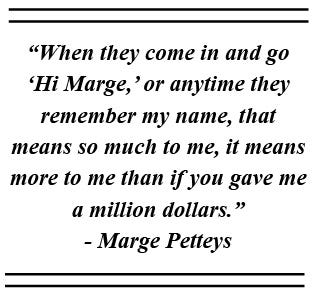
Students and Other Benefits
One aspect of working in Hamilton’s dining halls that nearly all the workers interviewed by
The Spectator
agreed upon was that interacting with students makes their jobs far better. “That’s the only reason I stay working here. You guys are awesome. Literally, the only reason I enjoy my job for shitty pay,” said the anonymous employee. “I have a really good rapport with all of you guys…I’m usually pretty friendly and it reflected well on me,” they continued.
Petteys said, “When they come in and go ‘Hi Marge’, or anytime they remember my name, that means so much to me. It means more to me than if you gave me a million dollars.” Morgan, who mans the omelet station during McEwen breakfast, said “the students are great…we try to get to know all the students that come in every day…we see you every day so we might as well get to know each other.”
“It’s mostly interacting with you guys that’s the cool part. Everyone’s from everywhere,” said Kurgan. Several Bon Appétit workers also said that students are far more respectful than customers that employees dealt with in prior jobs, “Everybody knows everybody because you see them every day…you guys understand how busy we are,” said Wally, joking that customers would “shoot you” if you messed up a McDonald’s order. “Respect goes a long way. When you kids show it, we feel it,” said Marge. “It makes me feel like my son’s here,” Sansone said. He continued, “I’m looking forward to my own son getting to college so he can have the same feeling that you guys get when you walk in the dining halls.”
Simmons said he preferred his job at the Diner over the other food service jobs he had worked in the past: “My Dunkin’ manager wasn’t great, and the coworkers weren’t great either.” Morgan had a similar feeling. “I like it here…this is the only kitchen I’ve worked in that’s been buffet style…this is the only one where we don’t have to pay for food… we can eat whatever we want.” Despite their critiques of Bon Appétit, the anonymous employee preferred it to their prior job as well: “This is way more professional…sexism, and sex talk, saying inappropriate things are not tolerated.”
Another perk that comes with working in Hamilton’s dining halls is time off during breaks between semesters. “That’s the biggest perk of this job, in my opinion, is the time off,” said Morgan.
Kurgan said that he loves not working in the summer because it enables him to be a “full-time dad.” He uses the break to hang out with his two young kids, bask in the sun and work on old cars in his friends’ garage. His typical shift runs from 3:00 p.m. to 1:00 a.m. at the Diner five days a week, so he can usually only see his kids in the early morning when they leave for school. Sansone agreed, “I think that it’s really fun getting the summer off. I get to spend it with my kids. It makes me feel young again…even if I’m not!” he joked.
Just before the publishing of this article, Kurgan and three other employees working at the Diner tested positive for COVID-19, once again leaving the Diner understaffed. “I can’t believe it,” said Kurgan.
These positive tests forced Bon Appétit management to forgo the Diner’s evening shift and close the dining hall at 4:30 p.m. on Tuesday, May 3. “We’re pretty fucked…They can’t run [the Diner] without workers,” lamented Kurgan. “We got nobody left.”
